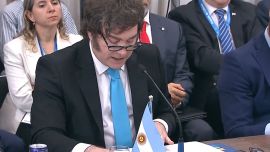Ask most people if Argentina is on the verge of breaking a losing-streak spanning more than half a century in order to produce sustainable economic growth, and they will probably burst into laughter.
Yet, it’s the position that is being put forth by Economy Minister Martín Guzmán, who this week had a leading role in a series of meetings held at the Casa Rosada aimed at aligning relative prices through so-called sectoral agreements, to the point where the chief executives of the most important companies in the country gave him, and only him, a standing ovation at a meeting that included several first-line members of President Alberto Fernández’s Cabinet. As the chief executives clapped — it must be noted the Argentine “titans of industry” including Paolo Rocca and Luis Pagani refrained from attending, sending their number twos instead — Guzmán presented his macroeconomic plan aimed at jumpstarting the economy through a five-percentage-point reduction in inflation, which in turn would allow for wages to outpace prices, creating a virtuous cycle that would help lower the fiscal deficit. To the amazement of Cabinet Chief Santiago Cafiero and his fellows at seeing the private sector applauding their policy plans, the quiet Guzmán took another victory lap consolidating his status as a primus inter pares in the Cabinet, first attained after the successful restructuring of the sovereign debt, gaining him a seat next to none other than Cristina Fernández de Kirchner last April when the Fernández-Fernández administration publicly exhibited its first major policy win.
Guzmán’s appeal stems from a technocratic approach to the field of public economics, coupled with a soft but convincing, almost stubborn, conviction in his plan. His theory and practice appeared unpolluted by our very own brand of political ideology that reinforces antagonism between extremes and is one of the underlying causes of “Argentine amateurism.” Whether or not one agrees with his policy positions, Guzmán appeared to break through the “grieta,” the deep polarisation that defines Argentine politics and tears the nation apart at its seams. Theoretical coherence and a sober way of talking has given the Economy Minister symbolic capital and credibility, which are essential tools in order to fix the mess that is the Argentine (un)productive apparatus.
Thus, it was surprising to see the Columbia University academician break with his usually moderate criticism of the previous administration to seemingly identify the Mauricio Macri government as the root cause of the country’s economic mismanagement. In a televised interview with journalist Marcelo Bonelli the day before meeting the CEOs, as Guzmán laid out his plan, he went back time and time again to the 2015-2019 administration’s failed policies, particularly the emergency loan Macri secured from the International Monetary Fund. At one point, Guzmán interrogated the interviewer, asking where the US$44 billion the country received in the form of history’s largest stand-by agreement had gone. “I don’t know, some of it went to capital flight, and part to strengthen reserves,” Bonelli mustered to answer. “The entire infrastructure of the nation could’ve been rebuilt. There’s nothing left,” the Minister replied.
This sparked the ire of several economists close to the Macri administration. Former economy minister Hernán Lacunza – another one of those peculiar politicians who is respected on both sides of the “grieta” – tweeted out that debt levels before and after the IMF bailout remained steady. “It wasn’t flown out [sic]. It didn’t increase [the debt pile]. It was used to pay down previous debt (from that administration and the previous one), shorter [maturity] and more expensive. Some for public works, some to finance the inertial 2015 deficit.” Sebastian Galliani, a former deputy economy minister to Nicolás Dujovne, was more aggressive: he blamed Mrs. Fernández de Kirchner for leaving behind an eight-percent deficit, while claiming that during her second term, CFK burnt through US$60 billion in subsidies (half of that only in 2015, an electoral year). “We could have urbanised all of the informal housing in the country,” he added.
There should be no doubt, however, that the Macri administration failed miserably on their main campaign promise: zero poverty. The economy imploded under Macri, proving its fragility in the face of a run on emerging markets in 2018, weak both because of structural issues and self-inflicted wounds. It is also undeniable that the IMF, run by Christine Lagarde and at the behest of Donald Trump, recklessly lent Argentina a boatload of money under shaky premises of debt sustainability due to ideological affinity, and a fear of a return to the worse days of Kirchnerismo. It should be equally undeniable that Macri received a ticking time bomb from CFK after her ruinous second mandate, in which she pilfered every corner of the state to finance an expired model of populist consumption-capitalism that led to stagflation, isolation and social division. Cristina and Macri were horrible presidents for Argentina, but rarely in our history have we had a positive grade in the economic report card.
Let’s take an extract from Lacunza’s “2015-2019 policy report”: “Poverty, unemployment, and inflation weren’t born with this administration: since 1984, average poverty rises to 36 percent of the population (using the current metrics), inflation reaches 68 percent on an annual basis (excluding bouts of hyperinflation), unemployment is at 11 percent and output has fallen on 15 of the 36 years of the democratic period. The “alfonsinista” dream that “we feed, cure, and educate with democracy” remains an implacable challenge since 1983.”
From a theoretical standpoint, Guzmán’s plan is sound. His read is that the structural lack of growth in exports hasn’t allowed Argentina to grow, given its incapacity to increase imports. Lack of dollars ultimately puts pressure on the balance of payments, which then sparks depreciations that feed into inflation. This is financed through debt or money printing, leading to a vicious cycle. His solution is a multi-pronged pluriannual plan to fix macroeconomic imbalances using the state as a countercyclical tool in order to attain economic growth by focusing on productive sectors while reducing the fiscal deficit and the Central Bank’s financing of the Treasury.
Putting that to practice sounds tough, but it will be even harder if, playing to the electoral needs of the Frente de Todos coalition, the minister oversteps his role and walks into the political arena. It isn’t clear whether his plan will work, but it has much more chances of failing if he begins to alienate the opposition.























Comments